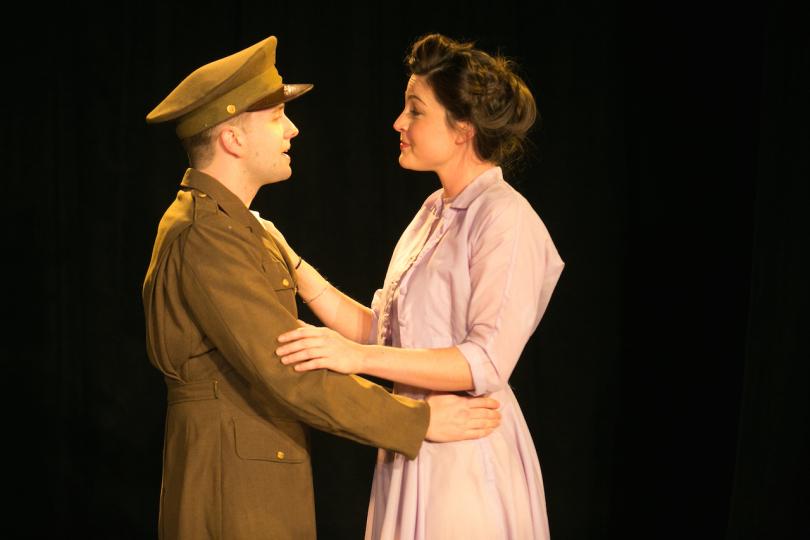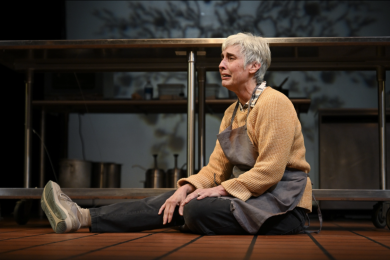Her story

We have not yet reached a day when young single motherhood is free of stigma, or when male privilege doesn’t cause problems in sexual situations.
This past week, a newborn baby was discovered in the stairwell at the Cathedral of St. Paul. Prayers and wishes were expressed for the mother who made the painful decision to leave him there. But I read of no one talking about the baby’s father and his own decisions. This past month, some University of Minnesota football players were suspended following allegations of sexual assault, and we watched the conflict get all the more messy because of these men’s high-profile position.
In The Bernice Project at Phoenix Theater, an ensemble of actors tells of the tensions between these realities though the true story of a Midwestern woman in the mid-20th century, showing us both how far we’ve come and how far we have to go.
We meet Bernice (Tiffany Cornwell, who carries the show earnestly) as a young woman in 1946. She is swept off her feet when her boyfriend returns home after fighting in World War II. After a few months, she realizes she is pregnant and scrambles to stay in rural Wisconsin’s good books. She makes the arrangements for her sweetheart to marry her, which, despite his professed love, is not an easy task because his family is Lutheran while hers is Catholic.
The couple manages to set a marriage date, but not before their families start an uproar. Their traditions, we learn, are about to get tested on a whole new level: Bernice’s boyfriend stands her up on their wedding day (he tells her he wants to be a “free man” and not tied down by their baby), leaving Bernice to face single motherhood, which her family and church consider a sin.
Not the man's responsibility
In these days, fathers were rarely required to pay child support, forcing single mothers to put their children up for adoption (in Bernice’s case, through the church) after giving birth. The common belief was that if an unmarried couple had a child, it was not the man’s responsibility. He could deny parentage if he wanted to while the woman was left with the blame of being “promiscuous” and causing a scandal.
With no financial support from her family, who has cut ties with her, Bernice faces an impossible situation. Still, she decides to do whatever she can to keep and raise her child. By teaming up with her county district attorney and a supportive nurse, Bernice sets off on an unprecedented quest for child support. By doing so, she takes a stand against the sexist constraints of her world.
Retelling a family tale
Meggie and Debbie Greivell crafted the play from retellings of Bernice’s story by her younger sister, Esther — one of their ancestors. The mother-daughter team skillfully used Bernice’s situation to illustrate the hurdles single mothers faced then, some of which, in more vestigial ways, still exist today. By showing us what happens when single parenthood is placed against the opponents of church, family, the law and the times, they opened an interesting discussion about women’s rights and male privilege.
Perhaps most interestingly, the creators painted a nuanced portrait of Bernice’s boyfriend, Roman (John Stark, who also played a supporting character to hilarious effect). Roman has just returned from fighting in France and Germany. When they are together, he seems to genuinely love Bernice. But he tells her, now that he’s back, he is not ready to settle down and have a family because he wants to make something of himself. He’s selfish and unaccountable, but he’s also a war hero. In Bernice and Roman’s day, having hero status was a get-out-of-jail-free card. He opted not to take on the consequences of pregnancy because society told him he didn’t have to.
Modern resonance
It made me think of our own local heroes. It seems clear that the accused players’ Division I athlete status had an effect on the dynamics of the recent university scandal. When their teammates boycotted team activities to demand lifting the suspensions, they suggested that no matter how grave the situation (which, at that point, was unclear to them), the players deserved special treatment. They leveraged their hero status in the local sports world in an attempt to extricate other men from the consequences of their actions. All of this so they could go back to pursuing their best interests — not unlike Roman. We saw the harsh consequences of this in the play. The piece was not about sexual assault, but it invited lots of thoughts about how male privilege persists, and how ugly it can get when the men involved are used to the town cheering for them.
Retelling a family tale, the cons
A big challenge of telling someone’s life story is, well, it’s someone’s life. Thanks to Bernice’s little sister and detailed research by the mother-daughter team, there was a lot of material to work with. But being related to the person whose story is being told offers an additional challenge: sacrificing parts of the story that took love-labored ages to dig up can seem even more sacrilegious than normal.
What I mean is, the play was long; more than two hours. I think some extra time spent trimming the script and working on pacing would have serviced Bernice’s story even more. Plus, while the vintage furniture and prop-laden tables did a great job to establish the world of the play, the actors spent so much time dragging them on and off between the short scenes that it grew distracting. Simplicity and deciding when to “kill your darlings” (in order to enrich your darling aunt’s story), could help the play shine.
What stood out despite all else was the inherent conflict in Bernice’s narrative, and her unrelenting push to build a life with her daughter. It was an elegy to other single mothers out there, in St. Paul or afar, who have to make difficult decisions every day. For these women, for Bernice’s creative descendants, and for audiences hungry for a powerful true story, I am glad hers was told.


